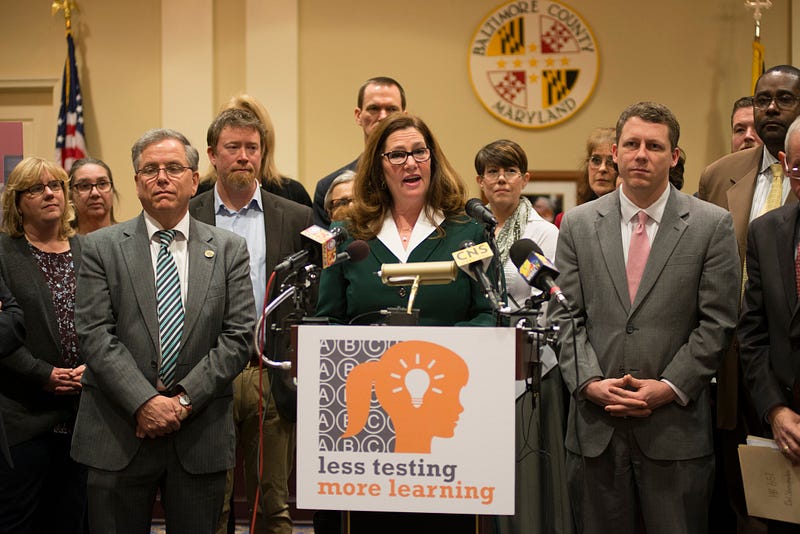It’s Time for Maryland to Limit Standardized Testing
With many districts unwilling to reduce testing, the General Assembly needs to step in.

When the Commission to Review Maryland’s Use of Assessments and Testing in Public Schools released its recommendations to reduce over-testing in July 2016, one recommendation in particular was hailed by commission members and educators: the creation of District Committees on Assessments (DCAs) to monitor, evaluate, and suggest reductions to a district’s mandated standardized tests. Educators would be part of the DCAs, leading to an inclusive, student-centered process to protect instruction time and limit over-testing.
“We felt like the locals who grapple with this problem understand what the problem is,” said commission chair Chris Berry in the Frederick News Post. Unfortunately, that assumption by the commission seems to have been way off.
Less than a quarter of school districts — five out of twenty-four — moved forward with the recommendation to form DCAs. Many districts not only rejected even discussing reducing assessments, but were highly dismissive of the idea:
•“This recommendation assumes that local assessments are the cause of concerns related to the overassessment of students. Not true,” wrote Carroll County in its response to the recommendation. (According to data collected by the testing commission, Carroll County has an average of 32 hours of locally mandated assessments in high school, the second-highest level in the state.)
•“The establishment of this committee assumes time spent on assessments stems from local assessments,” wrote Garrett County…which has an average of more than 25 hours of locally mandated assessments in high school, the fourth-highest level in the state.
•In rejecting the DCA recommendation, Anne Arundel County wrote that it “takes time and energy away from supporting students and teachers,” even though students and teachers have been asking for years for less time and energy be devoted to testing.
•And now-former Allegany County Board of Education member Edward Root lamented that “teachers…will have to go through and learn all about testing” to understand data on it. With the seventh-highest level of testing in grades 6–8 in the state, it seems like many Allegany County teachers are already pretty familiar with testing.
If Districts Won’t Address Over-Testing, the General Assembly Must
The refusal of most local school systems to engage on the issue and bring educators into the discussion isn’t sitting well with key education leaders in the General Assembly — and rightly so.
“I was disappointed that more didn’t put together local stakeholder assessment groups,” said Senator Paul Pinsky (D-Prince George’s), a commission member and Vice Chair of the Senate Education, Health, and Environmental Affairs Committee (as well as Chair of the Education Subcommittee). “If you look at the number of hours, there’s a lot of it at the local level. Some Eastern Shore counties spend a lot of time on testing, but we’re not sure there’s much to show from it,” Pinsky told the Baltimore Sun.
And as the Sun reported in the same article:
Some proponents have lost patience with the response of state and local education officials. Del. Eric Luedtke, who sponsored last year’s House bill, is among them.
“The state is saying the problem is really the locals,” the Montgomery County Democrat said. “The locals are saying the problem is really the state. And nobody is doing much of anything to cut down on testing.”
He plans to reintroduce his bill, as does Montgomery Democrat Roger Manno in the Senate.
The bill was introduced last week as the Less Testing, More Learning Act of 2017. It sets a 2% cap on the amount of annual instructional time that can be used for mandated standardized testing. It also creates District Committees on Assessments that include educators and will identify duplicative assessments and make recommendations on how to reduce over-testing.
It’s clear: too many districts aren’t going to take meaningful action to reduce over-testing without the General Assembly stepping in. It’s time to pass the Less Testing, More Learning Act of 2017 and finally put a stop to over-testing and protect time for learning. Click here to contact your representatives in Annapolis and urge them to support the bill.

